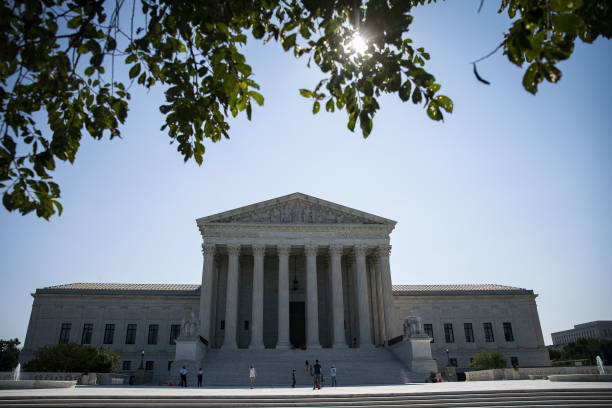On April 15, 2021, several Progressive Democrats in Congress introduced legislation to expand the U.S. Supreme Court from nine Justices to 13. The effort, co-sponsored by Democratic congressmen Hank Johnson, Jerrold Nadler, and Mondaire Jones, as well as Senator Ed Markey of Massachusetts, has almost no chance of advancing in the House. Shortly after the bill’s reveal, House Speaker Nancy Pelosi said that she would not bring it to the floor. Therefore, it can be assumed that the legislation would not have been supported by a plurality of Democrats or moderates.
Republicans, for their part, have blasted the bill as a form of Court Packing that violates the U.S. Constitution. President Joe Biden set up a bipartisan commission to look into reforming the Supreme Court earlier this year. But to this point, the commission has not made any recommendations. Democrats should be aware that expanding the Supreme Court will not actually solve any problems in the long run. However, it will certainly create problems in the short and long term.
Why Do They Want to Expand the Court
Many Progressive Democrats in Congress have supported the idea of expanding the Supreme Court because of its 6-3 Conservative majority. This plurality came about after the appointment of three Conservative Justices to the Court by former President Donald Trump. Democrats argue that at least two of the nominees, current Justices Neil Gorsuch and Amy Coney Barrett, were installed unfairly. This stems from the congressional nominating process for both individuals. First, after the death of longtime Conservative Justice Antonin Scalia in 2015, then-President Obama nominated Circuit Court Judge Merrick Garland to replace him.
However, a Republican-controlled Senate led by Majority Leader Mitch McConnell refused to hold a vote on Garland, stating that the winner of the upcoming 2016 Election should choose Scalia’s replacement. This fifteen-month stalling period understandably angered Democrats. Then, just six weeks before the 2020 Election, longtime Liberal Justice Ruth Bader Ginsburg passed away. Republicans, who still controlled the Senate at this point, rushed to confirm Barrett in Ginsburg’s place. This again infuriated Democrats who excoriated Republicans for their flip flop on the issue of Supreme Court nominations.
Based on the actions of the Republican-led Senate during the Trump Administration, many congressional Democrats now feel that it is only fair that the Court be balanced out by adding four new Justices to the bench. President Biden would appoint these and they would return the Court to a slight Liberal edge (7-6). Democrats have also not lost sight of the fact that Trump’s second nominee to the Nation’s Highest Court, Justice Brett Kavanaugh, was accused of sexual assault by a former colleague. The nomination of Kavanaugh and the confirmation process all occurred well within Trump’s Presidential term. However, Progressive Democrats still feel that the process was a sham and there should have been a more thorough investigation. Regardless, Kavanaugh was confirmed by the Republican Senate by a narrow 50-48 vote.
Two Wrongs Do Not Equal A Right
For Democrats, they are right to feel slighted by the actions of Mitch McConnell and the Republican-led Senate recently. However, the remedy to those concerns is not to pack the Supreme Court with loyal Democratic judges. Congress can increase the size of the Supreme Court; however, they would likely need close to a supermajority of support. It is clear to establishment Democrats like the aforementioned Pelosi that her caucus does not have the necessary support among its own ranks thanks to a large contingent of moderate Democrats who are not in favor of the idea. Then there are the Republicans, all of whom have expressed staunch opposition to the issue. That leaves Democrats with just the idea of packing the Court, with no real ability to ever act on it.
Anyone who follows politics knows that elections have consequences. Presidential elections specifically can help to shift the entire direction of the country every four years. So the issue that Progressive Democrats should address is knowing that the Supreme Court was due for vacancies in the near future due to its older makeup, the 2016 Election was going to be pivotal. As it turns out, a Republican President won the election and was able to choose three Justices for the Court. Democrats wagered that a controversial, scandal-plagued candidate in Donald Trump stood no chance against their preferred candidate, former Secretary of State Hillary Clinton. The problem was that Clinton too was scandal-ridden and generally had an unfavorable view from moderate voters. Ultimately, Clinton’s unpopularity and relatively low voter turnout helped propel Trump to the White House.
So we go back to the statement that elections have consequences. Perhaps if the Democrats wanted to ensure that they held onto the Executive Branch and thus were able to continue to fill Supreme Court vacancies, they should have nominated a stronger candidate with less baggage. 2016 saw only five candidates on the Democratic side vie for the nomination, three of which were relatively unknown. That left the very Progressive Vermont Senator Bernie Sanders as the only real competition to Secretary Clinton. The reason this occurred is that the Democratic Party seemingly anointed Clinton the throne after her unsuccessful 2008 Presidential run. So perhaps with a more diverse field in 2016, Democratic voters would have chosen a different candidate. And maybe this individual would have been able to defeat Trump and thus fill the vacancies on the Supreme Court.
The Other Side is Watching
Republicans in recent history have always strongly opposed expanding the size of the Supreme Court. For one thing, they now have a 6-3 conservative majority, so it would not be smart to add more Justices. Additionally, they argue that the Constitution and historical precedence lay out that the Court should not be packed when one side feels that they are at a disadvantage. Former President Franklin Delano Roosevelt’s attempt to pack the Court in the 1930s displays this. When he introduced the idea in an attempt to add Justices to the Supreme Court that would approve of his New Deal policies, his party and the public soundly rejected it. The current Republican Party and even some moderate Democrats are following suit and rejecting this idea now.
But theoretically, if a bill to expand the Supreme Court became law, its future implications would be far worse than any immediate relief to the current Conservative-leaning Supreme Court. Future Republican-controlled congresses will use it as a precedent to be able to expand the Supreme Court whenever they wish. If perhaps there was a GOP majority in the House of Representatives and Senate in ten years. And the current Supreme Court leaned 7-6 Liberal after its expansion, Republicans could turn around and do the same thing.
Perhaps they would add just two Justices to regain control of the Court at 8-7. Then, when a new wave of Democrats are elected to Congress, they would likely do the same thing. The point is that expanding the Court, even incrementally, will inevitably empower the other side to do the same. The result over time would be a twenty, thirty, or forty member Supreme Court. Now does that sound like a body that leaves politics out of the law? It sounds more like a body that is dependent upon politics and political regime changes.
The citizens of America should not want the Supreme Court to devolve into such a partisan exercise. This is in fact why Supreme Court Justices have lifetime appointments. The framers of the Constitution wanted to prevent politics from contaminating the Highest Court in the Land. This is why there are no elections or term limits in the Supreme Court, and why there never should be. If a Justice had to worry about an election every four years, perhaps they would rule on cases dependent on what gave them the best chance of reelection, not what the law dictates. It is for this reason that any form of introducing politics to the Supreme Court, be it elections, term limits, or yes, even expansion, should be summarily rejected.
The Right Course of Action
So if expanding the Supreme Court is not the best course of action to fix the bench, what is? Well, those who wish not to see a repeat of the Gorsuch and Barrett nominating processes should support congressional reforms. They could make it mandatory to vote on judicial nominees within a certain amount of time, perhaps three months. And there should also be no criticism of nominating Justices close to elections, as the incumbent President has the power to nominate judges until the very last day of their term.
If congress really wants to avoid the politics that has inevitably engulfed the Supreme Court, they should make it a priority to confirm judges based on their merits and qualifications, rather than their political beliefs. Presidents can also help by not nominating candidates who stray too far from the center in their judicial beliefs. It is for this reason that Supreme Court nominations and confirmation hearings used to be, for the most part, nonpartisan. So let’s strive to improve the Judicial Branch of the United States. And we can certainly do this without taking the reckless and unnecessary step of expanding the Supreme Court.
Main Photo:
Embed from Getty Images







